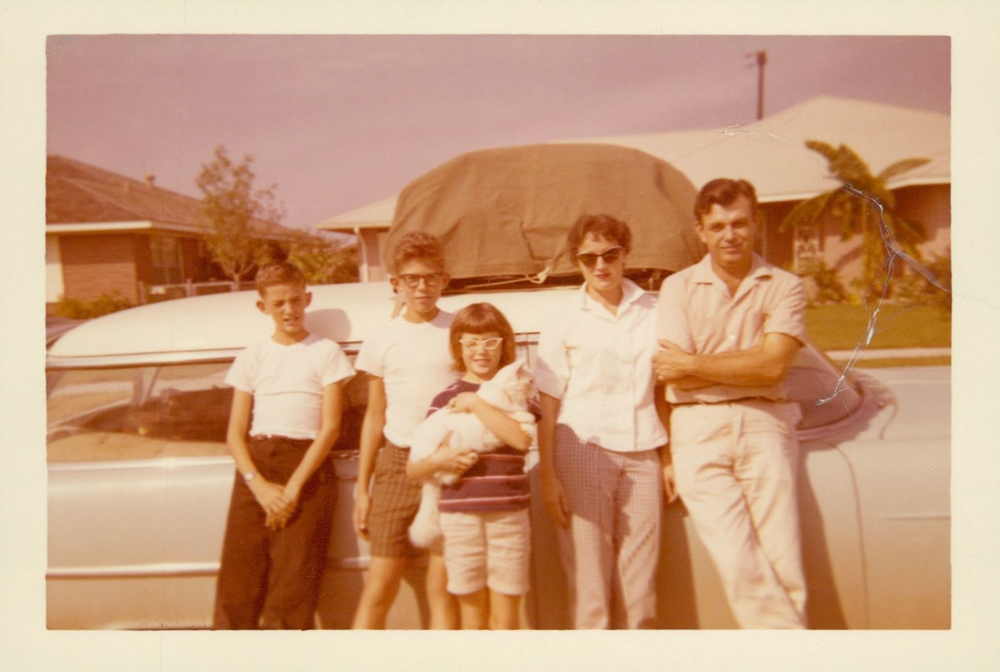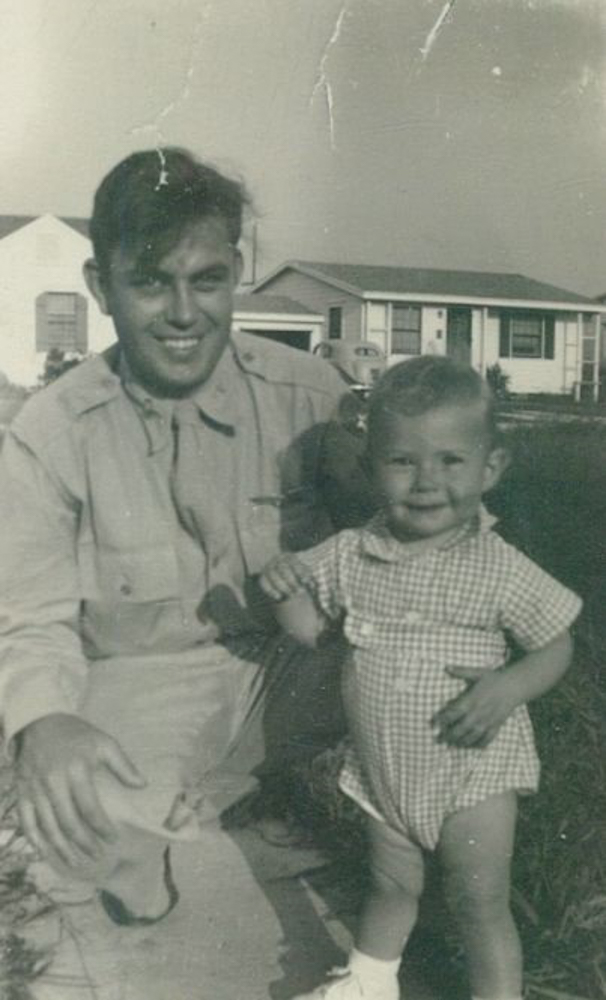Unsquare Dance
Dave Brubeck, the Megadeath Intellectuals, and My Father

In 1956 we lived in Fort Worth, Texas. Fess Parker was a neighbor and Davy Crockett, “king of the wild frontier.” One day Dad drove us out to the airfield to show us what he had been working on. Out of the hanger rolled the first B-58 Hustler, a delta-winged nuclear bomber with titanium-honeycomb wings. It was a beautiful “bird,” as Dad called it, and obsolete before the test pilot climbed aboard. After all, the Soviets had inconveniently just developed anti-aircraft missiles that could take out high-altitude bombers. Strategic Air Command was going to have to think further aloft. Dad placed in my hand a gift: a slice of wing the size of a piece of pie — and lighter than a feather. The It bird of the fleet was called “Greased Lightning.”
Dad had flown off to Europe as a kid to run bombing missions over Hitler’s troops, we imagined. For Dad was a man of few words about that war, confessing only that each time he pressed the bomb-bay button he hated it so much that he found himself hovering above his body, looking downward toward himself.
One day Dad brought home a shiny new Chevy wagon. He had landed a job on the West Coast, at a think tank. Mom and Dad loaded up the car, I pulled on my coonskin cap, my brother and little sister piled in, and after a long stretch of cactus we were in Santa Barbara.
Sometimes for lunch we would meet Dad and his colleagues downtown at Johnny’s Italian Market. They would wolf down salami-stuffed submarine sandwiches before regrouping across the street at an outfit called TEMPO, now the Santa Barbara Hotel.
I remember being puzzled when Dad flew back east to study game theory: the prisoner’s dilemma and its sibling riddles of deterrence. I could not imagine what bombs had to do with games. Years later TEMPO moved to the Balboa Building. If you were to stand in front of that edifice and beam yourself down through the sidewalk and down still farther through all the layers of concrete and steel, you would land within the confines of an immense nuclear fallout shelter.
TEMPO, a GE subsidiary, stands for Technical Military Planning Operation. It existed because the government was trying to figure out if the U.S. nuclear arsenal would be safer in the hands of generals, technocrats, or the new guy on the block, the computer. Safe was necessary because the U.S.S.R. and the U.S. had a lot of warheads. In fact, if you began exploding them — one bomb every 30 seconds equal to all the firepower of World War II, including Hiroshima and Nagasaki — you would have exhausted the U.S. and Soviet arsenals only after 14 days and nights of nonstop apocalypse.
It was, after all, the Era of Big Think. The technocrats, who came to be known as the Megadeath Intellectuals, ended up stealing the ball from the generals. Although some wanted to pass the ball to the computers, as far as I have been able to piece things together, those guys wolfing down submarine sandwiches — between trips back to the Pentagon and down to RAND in Santa Monica — were conceptualizing and designing the Polaris and Poseidon and Trident missile systems. These were the hardware incarnations of a strategic weapons posture they called MAD (mutually assured destruction), the namesake of the comic book.
The TEMPO gang’s collective sense of humor was cool, as evidenced in the wry comment of one surviving gang member I would bump into on his morning walks around Montecito. “It was easier back then,” he would sometimes quip. “We thought we knew who the bad guys were.” He had found peace contemplating La Casa de Maria’s oaks.
“Back then” had also been the Era of Cool Jazz. On the pop charts, the Dave Brubeck Quartet’s hits “Take Five” and “Unsquare Dance” had thundered in as musical shock waves, their lopsided rhythms blowing away a long-lived 4/4 rhythm dynasty. Dad had flown off to WWII to the tune of the Swing Era’s sure and steady 4/4 foot-tapping rhythm. Now, though, he would arrive home from work, kick up his feet, and sink into the lopsided 7/4-beat labyrinth of the “Unsquare Dance.” Brubeck, though, warned that tapping your foot, snapping your fingers, or clapping your hands along with the beat is “a challenge.” I felt Dad was so taken with the piece because it offered him a safe theater of operations in which to contemplate asymmetries akin to the Zen koans of deterrence the Megadeath Intellectuals brooded on all the livelong day. After all, a perceived asymmetry in arsenal symmetries could result in a big bang.

In “Unsquare Dance,” over the tune’s 7/4 rhythm, Brubeck plays “Turkey in the Straw,” a tune in 4/4 time. Brubeck writes in the liner notes that the piece is “deceitfully simple, it refuses to be squared. And the laugh you hear at the end is [drummer] Joe Morello’s guffaw of surprise and relief that we had managed to get through the difficult last chorus.” Most hand clappers, foot tappers, and finger snappers don’t get through. Like the asymmetries of the prisoner’s dilemma, the tune’s rhythmic asymmetries are too unstable. Squares blow it.
Fast-forward a decade or so, and the crew at TEMPO is now locking horns with Vietnam. I was a religious studies student at UCSB, and the family’s peacenik. I was immersed in Proto-Indo-European myth, lecturing my dad on tacit mythic assumptions about strength underlying the two opposing strategic cultures and haranguing him on wen/wu and Taoism’s aqueous, supple, yielding concept of strength, always seeking the lowest ground. In other words China’s tradition of guerrilla warfare (as adapted by Vietnamese general Võ Nguyên Giáp) versus the West’s musclebound, in-your-face, Indo-European Sky God approach: Indra, Thor, Jupiter, or Perun hurling down greased lightning bolts from an unassailable position aloft, while losing hearts and minds on the ground. Don’t get me started. I gifted Dad a book on Zen koans, urging him to consider that what we need for peace is not so much Think Tanks, but Oceans of Being. Oceans of Consciousness. Meditation. Retreat centers. Mom became a beginning but illumined meditator. Dad begins to sense in her a freedom beyond the koans of deterrence and begins meditating. He eventually quits TEMPO but still says nothing about WWII.
It is only decades later, only after Dad’s and Mom’s deaths, that I learn that in World War II my father had volunteered to fly in Operation Carpetbagger. On moonlit nights — using constellations, rivers, lakes, and railroad tracks as guides — they had dead reckoned their crews through the darkness deep behind enemy lines, landing sometimes in fields or on deserted roads. They supplied weapons, intelligence agents, and other assets to guerrillas in the French, Italian, and Low Countries resistance. And it was only then that I remembered: One sunny morning after moving to Santa Barbara when I was off surfing, Dad had flown off to Cuba to consult with Castro — on guerrilla operations. It may have been that conversation that convinced him, years later, that in Vietnam, America was going to get its ass handed to itself.
Recommended:
Reading: Sharon Ghamari-Tabrizi’s The Worlds of Herman Kahn: The Intuitive Science of Thermonuclear War
Viewing: Kuroi ame (Black Rain)



